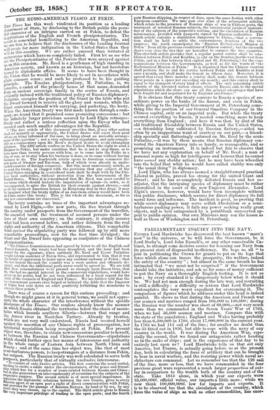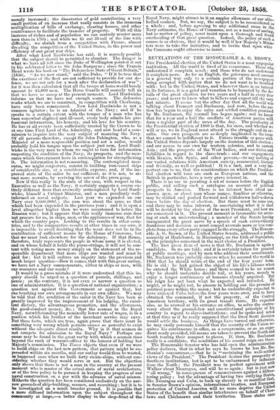PARLIAMENTARY INQUIRY INTO THE NAVY.
ErritEn Lord Hardwicke has discovered the best known "mare's nest" in the universe, or he will force the Government, be it Lord Derby's, Lord John Russell's, or any other conceivable Ca- binet, to attempt some decisive course for rescuing our Navy from its present state of disgraceful inefficiency. He begs us all " to join in petitioning the Crown for grants to put on its legs that force which alone can insure the prosperity, the welfare, indeed the safety of the country " ; but almost in the same breath he has intimated that " we must not be surprised " if the Government should take the initiative, and ask us for sums of money sufficient to put the Navy on a thoroughly English footing. It is not so now ; by every standard it is dangerously below what it should be. We had not men enough during the late war, and recruiting is still a difficulty : a difficulty so serious that Lord Hardwicke contemplates the very worst expedient for overcoming it. The comparison of figures which he adduces under this head is indeed painful. He shows us that during the American and French war our seamen and marines ranged from 105,000 to 140,000; during the Russian war the number was short of 68,000,—not very much more than we commanded in the Seven Years' War of 1763, when we had 56,600 seamen and marines. Compare this with the state of the population ; England and Wales having probably less than 6,500,000 in 1760, about 17,000,000 in the current year. In 1763 we had 113 sail of the line ; far smaller no doubt than the 33 fitted out in 1856, but able to cope with the navy of any country in the world. It was during the American War, espe- cially the second, that we found our antagonists rather heading us in the make of ships ; and is the experience of that day to be entirely lost upon us ? Lord Hardwicke tells us that not only America, but France, is actually going before us at the present day, both in calculating the force of artillery that can be brought to bear in naval warfare, and the resisting power which naval ar- chitecture can command. Let us remember too that the 120 sail of the line, more or less, that we have commanded in the four previous great wars represented a much larger proportion of out- lay in comparison to the wealth both of the country and of the state. Take 1815 alone, in which year our exports were 32,000,0001. official value, our imports a little more ; while we now think 100,000,0001. low for imports and exports. It is to be observed too that the circulation of the country, which fixes the value of ships as well as other commodities, has mos.,
measly increased ; the discoveries of gold contributing a very small portion of an increase that really consists in the immense multiplication of bills of exchange, clearing houses, and other contrivances to facilitate the transfer of property. With all this increase of riches and of population we can scarcely muster more men than in 1763 ; and while we fit out 33 sail of the line with difficulty, we shrink from a competition with France, almost dreading the competition of the United States, in the power and efficiency of our great war ships.
After what Lord Ilardwicke has said, it is scarcely possible that the subject should be permitted to slumber. The danger is what we have all felt since the Duke of Wellington pointed it out in his celebrated letter to Sir John Burgoyne ; since Sir Francis Head wrote his book on " The Defenceless State of Great Britain," (1850), "As we now stand," said the Duke, " If it be true that the exertions of the fleet are not suffieient to provide for our de- fence, we are not safe for a week after the declaration of war" ; for it was then calculated that all the troops at home would barely amount to 45,000 men. The Horse Guards will scarcely tell us that we have so many at the present moment. Lord Hardwicke informs us that we have not enough seamen. The defensive works which we are to construct, in competition with Cherbourg, have only been commenced. Now Lord Hardwieke is not a common agitator ; he is an Admiral of the Navy ; and if he speaks to a certain extent with the temper of a man who has been somewhat slighted and ill-used, every body admits his pro- fessional information, his honesty, and his love for his country. He has at all events been sufficiently trusted by the Crown to be at one time First Lord of the Admiralty, and now head of a com- mission to inquire into the very subject of manning the Navy. Of all persons therefore, except Sir John Pakington, who, as a Minister of a more responsible position and not a sailor, would probably hold his tongue upon the subject just now, Lord Hard- wicke is the very man to whom we ought to turn for information respecting the condition of the Navy, its prospects, and the mea- sures which Government have in contemplation for strengthening it. The information is not reassuring. The contemplated mea- sures, we might conjecture, consist in building iron-cased ships of considerable size, at a considerable expense, and, if the im- proved state of the sailor be not sufficient, as it is not, to at- raot more recruits, by reviving the screw of the press gang.
_Now if this really is the state of the ease, with respect to the Executive as well as the Navy, it certainly suggests a course en- tirely different from that avowedly contemplated by Lord Hard- wioke, himself a Cabinet Minister, and a man peculiarly well- informed on naval subjects. Last year we expended on or Navy over 9,000,000/. • the sum was about the same as that which had been expended in the previous year ; and it is upon a level altogether higher than we were accustomed to before the Russian war ; but it appears that this really immense sum does not procure for us, in ships, men, or the appliances of war, that for which the country pays. Looking to the results in other coun- tries, and to the comparative results at other times in our own, it is impossible to avoid doubting that the want does not lie in the contribution of sufficient means by the House of Commons, but that we must look elsewhere for the deficiency. If that iouse, therefore, truly represents the people in whose name it is elected, and on whose behalf it holds the purse-strings, it will not be con- tent with voting more money simply on the statement of the re- sponsible department that more ships are wanted and must be paid for ; but it will enforce an inquiry into the previous and much larger question—How it comes, that with this great outlay, we have not a Navy commensurate, either in ships or men, with our resources and our needs?
It would be a gross mistake if it were understood that this in- quiry should be urged as a question of pounds, shillings, and pence ; on the contrary. it is not even so narrow a question as one of administration. It is a question of national organization ; a question not against this Government or against that, but one touching our own arrangements in our own affairs. We may be told that the condition of the sailor in the Navy has been so g,reatly improved by the improvement of his lodging, the excel- lent dietary, the advantageous promotion, and the allowances, the good-conduct money, &c. ; that the seaman in the Royal Navy, notwithstanding the nominally lower rate of wages, is in a position which his brother of the merchant service may envy. But these facts, which are true, again prove that there must be something very wrong which permits causes so powerful to exist Without the adequate direct results. Why is it that seamen do not compete for admission to the Royal Navy ? Perhaps one cause may be found in the great rarity with which a seaman rises beyond the rank of warrant-officer to the honour of holding her Majesty's commission. The Times objects that even if we were to build ships on the last new pattern, that pattern might be su- perseded within six months, and our outlay would thus be wasted, as happened once when we built forty steam-ships, without con- sidering whether they would serve or not. But the objection only shows that there is not a man in the country at the present moment who is master of the actual state of naval architecture, or of the true policy to be pursued in keeping the progress of our naval construction on a par with the advance of naval science. Hitherto the question has been considered exclusively on the nar- row grounds of ship-building, seamen, and recruiting ; but it is to be investigated on a much broader ground. It is possible that a more diffused information upon the subject throughout the community at large,—a better display in the shop-front of the Royal Navy, might attract to it an ampler allowance of our able- bodied seamen. But, we say, the subject is to be reconsidered as a whole ; and, before agreeing to any additional sums in the Navy estimates, the House of Commons, not as a matter of saving, but as matter of policy, must insist upon a thorough and frank overhauling of that great question. Indeed, the policy of such a coarse is so obvious, that it would. be well if her Majesty's Minis_ tens were to take the initiative, and to invite that upon whie the Commons ought otherwise to insist.



























 Previous page
Previous page